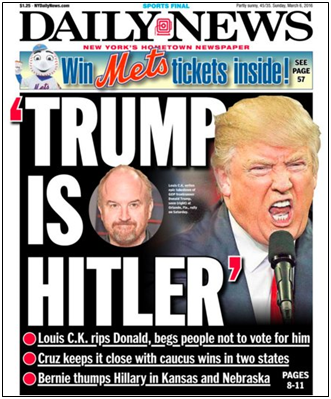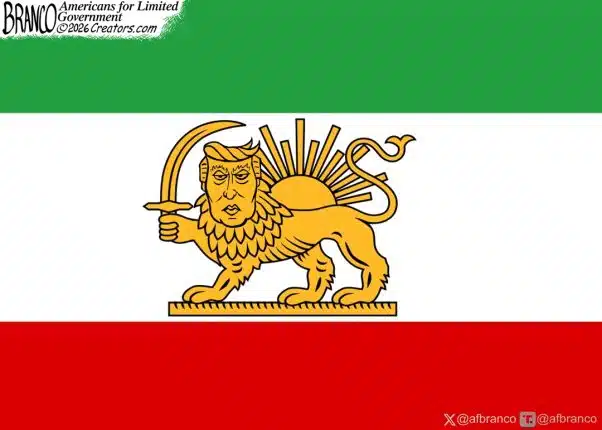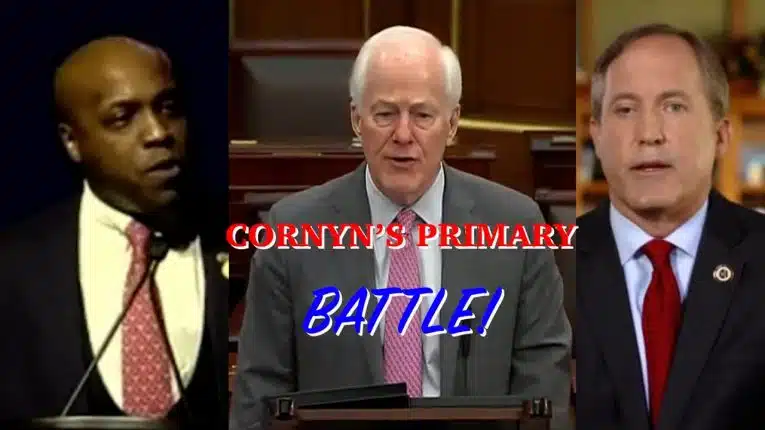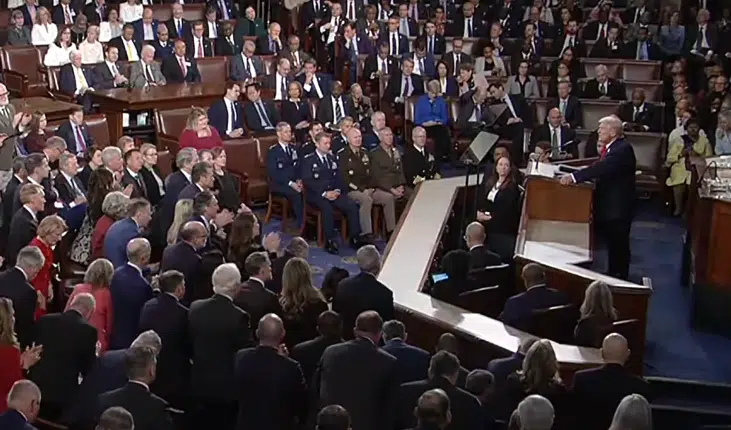“This is how fascism comes to America.”
So reads the alarmist, provocative headline from the Brookings Institution’s Robert Kagan writing for the Washington Post that the Republican nomination of Donald Trump is essentially the modern equivalent of Hitler and Mussolini’s rise to power.
It’s the 1930s all over again, wouldn’t you know. Besides being fallacious, Kagan’s charge — and that of many, many other commentators — is reckless and irresponsible. Even dangerous.
Let’s leave aside the facts that Trump’s son-in-law is Jewish, and that his daughter converted to Judaism, both of whom Trump fully embraces. Or that he opened up the Palm Beach mansion and golf course Mar-a-Lago to Jews and blacks at a time when segregation at all-white country clubs in the south was still a thing, long before he ever set foot in the political arena. So, gee, what the heck does Trump running for president have to do with the racist, anti-Semitic ideology of the Nazis? Those examples are too easy.
Getting to the heart of Kagan’s case, he writes, “Fascist movements, too, [like Trump] had no coherent ideology, no clear set of prescriptions for what ailed society.”
In reality, fascism is the textbook example of an abominable, antidemocratic ideology run amuck, that believed one ruler could embody the entire will of the nation. But there was more to it than that. Combined with its national destiny mythos, racist doctrines and corporatist economic programs — war is profitable! — its coherence and rigid execution was directly responsible for the deaths of 60 million people, many through mass genocide, in the war the fascists and militarists started in the 1930s and 1940s.
As Michael Ledeen, a noted, actual expert on fascist movements, notes in Forbes magazine in response to Kagan, “It’s fanciful to call Nazism a bundle of contradictions when, a decade before coming to power, it had a detailed diagnosis of what ailed Germany, and how to fix it. It was called Mein Kampf, and it provided the basis for the Third Reich. Kagan apparently doesn’t consider the Nazis’ racist doctrines to be explicit either, even though they were the basis for very detailed legislation, indoctrination in all the schools and universities, military operations, and eventually the Holocaust. Nazism was a great deal more than one-man rule by a charismatic leader.”
In the meantime, Trump does not believe it is America’s destiny to rule the world — quite the opposite — as he critiques episodes such as the Iraq war in the 2000s. Agree or disagree with his position on the war, opposing the war, even after the fact, is definitely not the ideology of militarism and war under fascism — which mobilized the war industry as an expression of state power, to settle historical scores and to impose rule upon those deemed inferior.
Instead, Trump’s articulated caution on the foreign policy stage, if anything, is actually an expression of realism over idealism in international affairs.
Trump openly rails against corporate cronyism, the real culprit behind the modern destruction of representative government in the U.S., where national legislation and policy is crafted by the highest bidder. Examples abound, whether under the Export-Import Bank, the bank and auto bailouts, the widely backed 12-nation Trans-Pacific Partnership trade pact, the green energy scam or health care lobbyists writing Obamacare.
Trump did not create the corporate state, and to the extent he speaks out against it positions him as an anti-corporatist, rather than as one of its champions. Agree or disagree with his solutions, he’s calling attention to a real problem of collaboration between certain industries and the federal government to achieve national objectives, the very definition of corporatism once envisioned by the fascists.
Trump also speaks out against threats like radical Islam, which really is a fascist-like ideology bent on the domination of Islam over the entire world, the extermination of non-believers and the oppression of women. Isn’t Trump’s condemnation an expression of anti-fascism? Standing up to barbarians — such as with calls to halt immigration from where radical Islam thrives — is no vice. Agree or disagree with that far-reaching prescription, there is no question radical Islam threatens Western, liberal democracies.
Trump stands opposed to illegal immigration, not because, as Kagan charges, Trump wants “to get tough with foreigners and people of nonwhite complexion,” but because simply they came illegally. That is not a racist attitude, since it does not distinguish between countries of origin. Come here legally, whether from Mexico City or Beijing, no problem, says Trump. Having enforceable borders or immigration laws generally is not even a tenant of fascism, it is a reality of every single country in the world that checks passports upon entry.
Trump says he wants to work with Congress rather than through the unaccountable executive actions of Barack Obama and George W. Bush that have governed the past 15 years. Wouldn’t that be the opposite of the all-powerful executive envisioned under fascism?
Today, Washington, D.C. is really a marvel of modern statism, where Congress has outsourced much of its Article I law-making powers to an alphabet soup of departments and agencies that regulate almost every aspect of life. Two-thirds of the budget runs on auto-pilot beyond the annual appropriations process, racking up trillions of dollars in debt. Classified surveillance programs such as conducted by the National Security Agency were conceived and run without any basis in law, framers of the original Patriot Act warned after the Edward Snowden revelations like Rep. James Sensenbrenner (R-Calif.) who authored the bill.
Now, Trump may not stop each of these encroachments by the executive branch and abdications by the legislative branch, but he hardly created them. The administrative state has taken more than a century to reach its current state of maturity, and it will hardly be undone in a single administration — if ever — as the obstacles to untangling it could prove to be insurmountable. But through signaling his intention to work with elected leaders in Congress, rather than via executive dictates, Trump at least articulates a preference for lower-case republicanism and representative government. Which is definitely not fascism.
In short, Robert Kagan should know better, although that doesn’t stop him and others from laying the fascist charge against Trump. But it is not merely wrong in an academic sense and ignores all the real fascism that exists in the world around us — it also a dangerous line of rhetoric.
As Dilbert creator Scott Adams presciently warned on March 13 as the Trump equals fascism meme was becoming commonplace in our discourse, “we see the media priming the public to try to kill Trump, or at least create some photogenic mayhem at a public event. Again, no one is sitting in a room plotting Trump’s death, but — let’s be honest — at least half of the media believes Trump is the next Hitler, and a Hitler assassination would be morally justified.”
Almost on cue, just a week ago, best-selling fiction author Brad Thor on the Glenn Beck Show openly discussed the assassination of Trump on the air with millions of listeners. Said Thor, “He is a danger to America and I got to ask you a question and this is serious and this could ring down incredible heat on me because I’m about to suggest something very bad. It is a hypothetical I am going to ask as a thriller writer. With the feckless, spineless Congress we have, who will stand in the way of Donald Trump overstepping his constitutional authority as President? If Congress won’t remove him from office, what patriot will step up and do that if, if, he oversteps his mandate as president, his constitutional-granted authority, I should say, as president. If he oversteps that, how do we get him out of office? And I don’t think there is a legal means available. I think it will be a terrible, terrible position the American people will be in to get Trump out of office because you won’t be able to do it through Congress.”
In other words, you’d have to kill him. Thor all but say it aloud. Responded Beck, “I would agree with you on that…” Really? Which part?
Sirius XM has since suspended Beck’s show based on the segment — because according to a company statement it “may be reasonably construed by some to have been advocating harm against an individual currently running for office, which we cannot and will not condone.”
Thor attempted to walk back his statement, suggesting he was actually calling for armed revolution against a dictatorial Trump — saying, “If we had to unseat a president without the backing of the Congress, we would need a patriot along the lines of George Washington to lead the country from tyranny back to liberty.” We’ll leave it to readers to decide whether civil war would be a preferable alternative.
But the damage could already be done.
Just as Adams noted, “Collectively — the media, the public, and the other candidates — are creating a situation that is deeply dangerous for Trump.” Specifically, someone could take a shot at him, and it will likely be directly related to the number of charges of fascism that have been leveled at him. As if the U.S. was on the brink of committing mass extermination of undesirables — which is basically implied by pervasive use of the Nazi charge — and that the only way to stop it is for patriots to take matters into their own hands.
This is becoming an incitement to mass hysteria, and it is wrong, irresponsible and, yes, dangerous. It’s not even remotely true, but here we are.
In effect, Robert Kagan, Brad Thor and others are playing with fire. For cooler heads to prevail will require careful, rational discourse about what fascism actually was — something that is clearly lacking today. Take a deep breath, people. This is getting out of hand.
Robert Romano is the senior editor of Americans for Limited Government.







